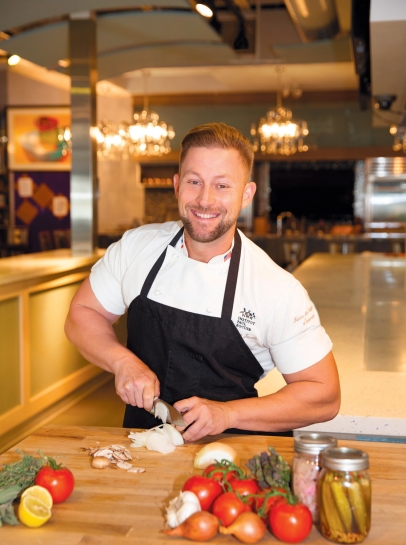Chef Bryan Jacobs Vets 2 Chefs
Bryan Jacobs learned many of his kitchen skills growing up cooking alongside his grandfather, a former chef in World War II. They spent most of their summers together and in the mornings over coffee, hot chocolate, and cornflakes, they pondered the most important question of the day, which was what to make for dinner. They were practicing farm-to-table well before it became a modern-day trend.
“If we wanted fish, we fished. Clams, we went clamming. We foraged our own mushrooms,” Jacobs says.
During high school he took busboy and dishwasher positions. One day the sauté chef didn’t show up for work and Jacobs was asked to step in. The head chef was astonished by his talents and promoted him almost immediately.
Coming from a lineage of military veterans—his grandfather, father, uncles, and brother all served in different capacities—Jacobs’ interest was to go a different route and attend college. His grandfather urged him to enlist for just two years before continuing his formal education. Seven days after high school graduation, his grandfather passed away.
Despite his nonmilitary game plan, he said, “It was my grandfather’s last wish. I had to go.”
Jacobs excelled and ranked high in the military and was even cited for bravery in combat. The military teaches common sense, staying alive, working as a team, and brotherhood. What it doesn’t teach is how to get by in the real world. Jacobs explained that after serving the country, once veterans are back in the real world they often are unable to find work. They haven’t earned a degree and aren’t certified in a skill.
“Having lived through something so astronomical, once out, you don’t know who you are or what your purpose is. Finding a purpose back in civilian life can feel like an ongoing war.”
“In the military, you are serving a higher purpose and then you have this struggle being part of death where you feel responsible, there’s a darkness,” he explains. Some fall prey to PTSD, anger, depression, alcoholism, a life of crime, and homelessness.
Like many veterans, Jacobs felt lost and without an identity. At 26 years old, he went through 23 different jobs and eventually found himself homeless. He heard his grandfather’s voice inside his head saying, “Get your life together because no one is going to do it for you.”
Searching for direction, he remembered his passion for cooking and decided to attend the Culinary Institute of Virginia.
After graduating, he interned at the highly acclaimed River’s Inn in Gloucester Point, Virginia, under Executive Chef and Culinary Director Hans Schadler, who’s known as the “culinary grandfather,” with a reputation for being tough. Schadler quickly recognized Jacobs’ talents and said, “You get it.”
Jacobs felt that finally someone got him, that he fit. “I understood teamwork, timing, and creativity. Combat is like the kitchen: You don’t think, you act. Changes happen in milliseconds.”
After some time under Schadler’s mentorship, Jacobs was sent to work for Peter Timmins, a master chef, the highest and most demanding level of achievement recognized by the American Culinary Federation. He was one of 60 in the world who was awarded that title. Jacobs arrived at the iconic Gasparilla Inn in Boca Grande and was put straight to work after driving for eight hours that day.
Just as it is in the military, you have to earn your place in the kitchen. Duties included family meal prep for 220 people and having to plan an entire menu in 10 minutes.
Jacobs watched the Master Chef closely. “I wanted to be that guy.” He worked his way up to lead line cook, chef de party, and sous chef in the kitchen which fed 450 fine-dining guests per night. These guests included the Bushes, the DuPonts, and the Hamilton family of Campbell’s soup fame.
While Jacobs was climbing the culinary ranks and continuing his studies at the University of South Florida Sarasota-Manatee, his brother, who was still suffering after having served, took his own life.
This was a turning point for Bryan Jacobs.
“There was one vet I’ll never get back. I want to save the rest of them.”
In 2014, Vets-2-Chefs was established as a nonprofit. It falls under the umbrella of Vets- 2-Success, which are food- and brew-focused programs Jacobs created to help rehabilitate displaced veterans. The program is designed to inspire, mentor, educate, and acclimate vets who are homeless, giving them a life purpose while creating a positive impact in their local communities.
“In the military, it’s not about one person, it’s about the team. Every part of a meal that leaves the kitchen comes from a member of a team: the appetizer, protein, sauce, vegetable, and dessert.”
Seeing the parallels between the military and the kitchen, he connected the dots and wrote the curriculum to train veterans in culinary during a 12-week certification course at University of South Florida Sarasota-Manatee.
In the classroom Jacobs holds up a lemon and asks his students what they see. “It’s a garnish, a finishing sauce, a pie, sorbet,” he answers.
This is his way to teach vets to see their lives not as where they are, but rather what they can become.
“The culinary-related things I learned as a child propelled me to be where I am today and I saw an opportunity to change the world through food.”
Vets-2-Chefs has an 86 percent success rate, and 100 percent job placement at local hospitality establishments upon course completion.
“The journey only makes sense after you have lived it.”
Jacobs isn’t stopping here. He has a few new endeavors brewing as well.
“I have my ‘why,’ that’s all I can say.”





